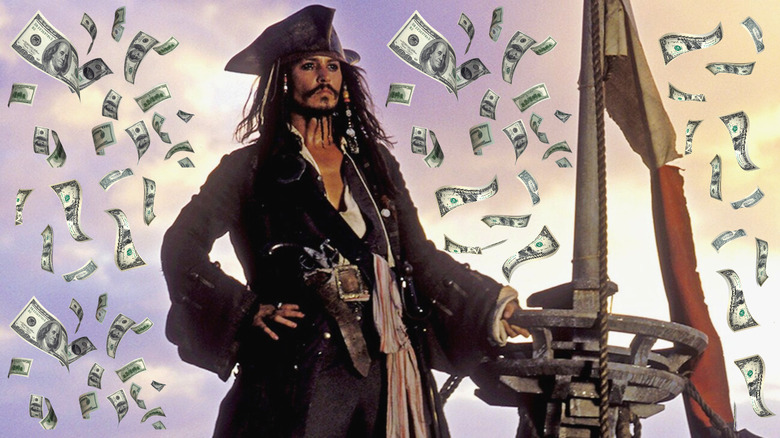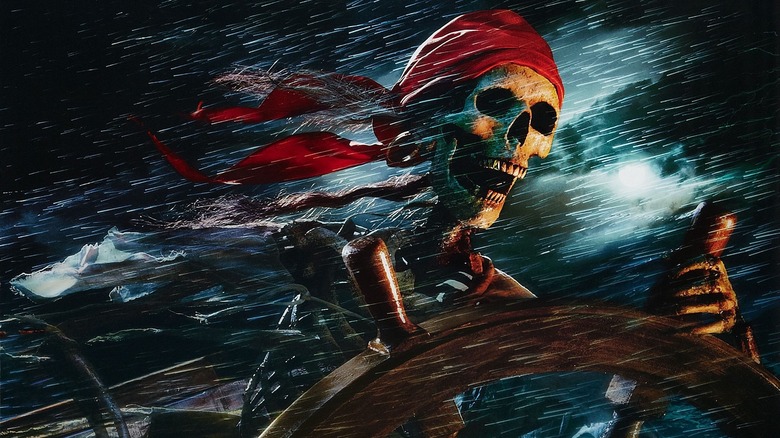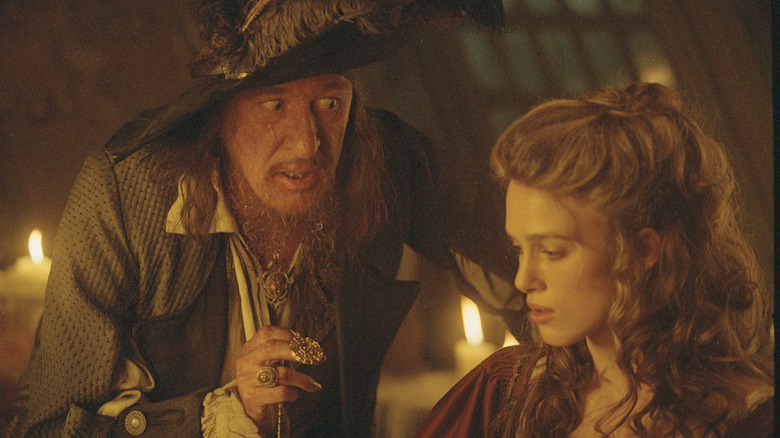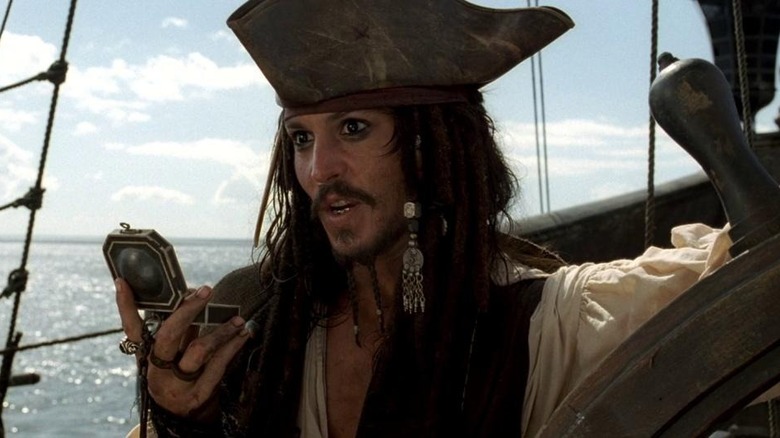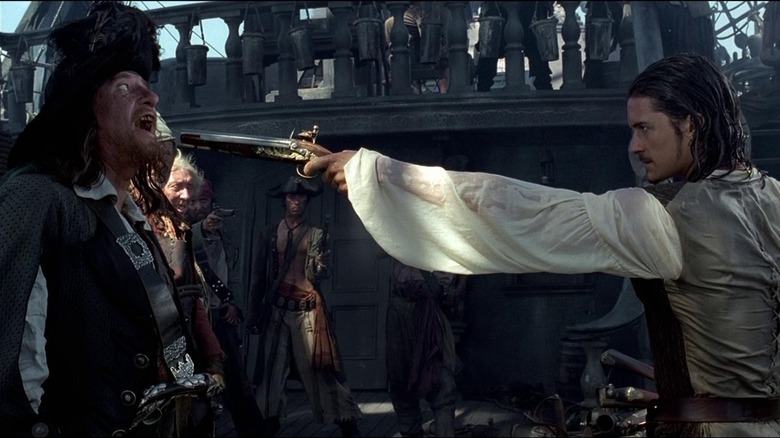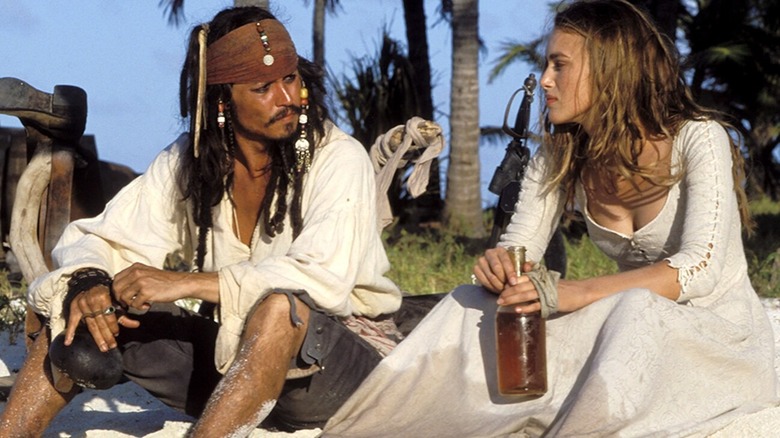Pirates Of The Caribbean Remains Disney's Only Ride Turned Hit Franchise
(Welcome to Tales from the Box Office, our column that examines box office miracles, disasters, and everything in between, as well as what we can learn from them.)
Disney's most successful, new franchise over the last 20 years (created in house, anyway) is far and away "Pirates of the Caribbean." Yes, the Marvel Cinematic Universe is bigger, but that was only made possible through an acquisition after the enterprise was already off to the races. In this case, this was a movie based on a Disney attraction that proved to be a gigantic hit, spawning a multi-billion-dollar series. Naturally, the Mouse House has tried to emulate that success ever since, but nothing has even come close. Beyond that, you could argue that every other attempt has actually been a sizable misfire. That streak looks to continue as Disney's new "Haunted Mansion" (read our review here) is in for a rough weekend.
But it's understandable that the studio would try to recapture the magic that happened when director Gore Verbinski's "Curse of the Black Pearl" managed to become not just a success financially, but one of the better pieces of popcorn filmmaking in the 2000s. Unfortunately, lightning in a bottle is sometimes lightning in a bottle and, attempting to recapture that is a fool's errand, so much so that Disney may have lost more money chasing this dragon than they made off of Johnny Depp's Jack Sparrow over the years (and that's saying something).
In honor of the release of "Haunted Mansion," we're looking back at "Pirates of the Caribbean: The Curse of the Black Pearl," how it became an odds-defying success story, what happened after it did, the flops Disney suffered in trying to replicate that success, and what lessons we can learn from it in the modern context. Let's dig in, shall we?
The movie: Pirates of the Caribbean: The Curse of the Black Pearl
The story of the movie truly starts with the theme park attraction of the same name, which has been a staple of Disney's theme parks for decades. The script, meanwhile, beings and ends with Ted Elliott and Terry Rossio, who thought they could, perhaps, reinvigorate the pirate genre by giving it a supernatural twist. The project changed hands a few times as Disney tried to figure out whether or not they wanted to make "Pirates of the Caribbean" a theatrical release or a direct-to-video affair. Once legendary producer Jerry Bruckheimer got involved, it was always going to go theatrical, and he circled right back to Elliott and Rossio, who actually based the supernatural element on the ride's opening narration, as explained in the film's DVD commentary track.
Orlando Bloom and Keira Knightley were cast as Will Turner and Elizabeth Swann, respectively, as the effective leads of the film. But Johnny Depp's casting as Captain Jack Sparrow would come to define not just the first film, but the franchise as a whole. It's a choice that, in hindsight, was obscenely important, espeically considering what could have been, as Jim Carrey and Michael Keaton were also considered. Depp would, ultimately, receive an Oscar nomination for his flamboyant take on the fated pirate but, during production, it made the brass nervous.
"Jerry was slightly uncomfortable and the Disney executives weren't exactly enthusiastic about it. I said, 'Look, these are the choices I made. You know my work. So either trust me or give me the boot.' And luckily, they didn't," Depp said to IGN ahead of the film's release. The actor famously based the performance on Rolling Stones guitarist Keith Richards. Moviegoers ate it up, and it ended up rocketing Depp to superstardom. His off-screen troubles, particularly with his ex-wife Amber Heard, would eventually overshadow his career but, for a time, thanks to this movie, he was as big as movie stars get.
A big investment, a nervous executive
Bruckheimer, generally speaking, doesn't make cheap movies, and Verbinski has a knack for painting with a big canvas. This all led to a much larger film than then-head of Disney Michael Eisner had in mind. So much so that he actually tried to stop the movie from happening at various points. In James B. Stewart's book "DisneyWar," it's explained that Bruckheimer had to sell Eisner on this larger vision for a "Pirates" adaptation. After showing the executive what they had in mind, Eisner said, "I love it. Why does it have to cost so much?"
At that time, Bruckheimer countered with, "Your competition is spending $150 million," citing movies such as "The Matrix" and "The Lord of the Rings" that were massive hits around that time. "The theme park is a drawback," Eisner said. "Let's move this away from the park." And so they did. The movie was all the better for it. But it wasn't an easy undertaking as more money meant, in some ways, more problems. Verbinski, speaking with the BBC, explained how difficult it was shooting a movie of this scale, particularly when having to shoot on the water:
"This movie has 700 visual effect shots, but there are probably 150 you notice — 500 effects shots are just getting rid of city lights or hotels in the background. My approach was just to keep shooting. If there's an oil tanker driving through the background and it's going to cost an hour of shooting to wait for it to clear the frame, you roll and paint it out later on the computer. That was the only way to keep the thing on schedule. Visual effects are just another tool in the chest now."
But Verbinski got through it, Disney ponied up the dough, and despite skepticism from many onlookers, the studio was about to deliver one of the biggest hits of 2003.
The financial journey
It should be emphasized that there was much skepticism in advance of the film's release and it was not expected to become a hit, not to mention one of the biggest movies of the year. Be that as it may, "Pirates of the Caribbean: The Curse of the Black Pearl" entered theaters on July 11, 2003, with an unruly title and a wave of surprisingly positive reviews from critics. Despite heavy competition, the allure of this supernatural, swashbuckling adventure was too tantalizing for audiences to pass up.
"Curse of the Black Pearl" opened to $46.6 million domestically, easily topping "The League of Extraordinary Gentlemen," as well as "Terminator 3: Rise of the Machines," which was in its second weekend. The bigger thing, though, was what happened in the weeks ahead, with word of mouth propelling the film to very, very strong holds week-to-week. It played well all the way through Thanksgiving, finishing its run with $305.4 million domestically and an even more impressive $348.8 million internationally for a grand total of $654.2 million. Even with the $140 million production budget, that was a home run. The film ended up being the fourth biggest movie of 2003, behind "The Matrix Reloaded," "Finding Nemo," and "The Lord of the Rings: The Return of the King."
Disney wasted precisely zero time in getting sequels going, with Verbinski returning to direct both 2006's "Dead Man's Chest" and 2007's "At World's End" back-to-back. Both of them would become even bigger (and more expensive) hits, earning $1 billion and $961 million worldwide, respectively, against combined budgets totaling a stupefying $525 million. Still, with ticket sales like that, the math ultimately checked out in the studio's favor. But that flavor of success wouldn't extend beyond the "Pirates" franchise.
When failure outweighs success
Two more "Pirates of the Caribbean" movies were produced in the aftermath of the original trilogy, including 2011's "On Stranger Tides" and 2017's "Dead Men Tell No Tales." Both were pretty successful, earning $1.04 billion and $794 million at the box office. But "On Stranger Tides" carries the distinction of being the most expensive film ever made, with a staggering $379 million production budget. That isn't sustainable and is far too much money to risk on any single film. But, all told, this franchise is a massive success with $4.5 billion at the box office to its name. That's a major feat.
The problem is, Disney has chased this dragon repeatedly in the years since (and actually before) with absolutely no real success to speak of. There was Brian De Palma's "Mission to Mars" in 2000 ($111 million worldwide/$100 million budget) and "The Country Bears" in 2002 ($18 million worldwide/$35 million budget) before "Pirates." Then there's what came after, with Eddie Murphy's "Haunted Mansion" arriving later that year ($182 million worldwide/$90 million budget). Though not nearly as big of a disaster as what came before, it was far from a success.
There's also Brad Bird's "Tomorrowland" from 2015, which was a major disaster, taking in just $209 million worldwide against a hulking $190 million budget. Disney has tried to position 2021's "Jungle Cruise," which starred Dwayne Johnson and Emily Blunt, as a success while grading on a pandemic curve. That film earned $220 million worldwide on a $200 million budget — before marketing. How is that a success? Dear reader, I'm sure I do not know, but the studio is (or at least was) developing a sequel. Maybe that was for the sake of optics? In any event, every attempt to recapture the success of "Pirates of the Caribbean" before or since has failed and failed spectacularly in most cases.
The lessons contained within
I'm not here to argue that studios shouldn't look at the success of a given thing and try to emulate it in some way. It would have been downright silly for Disney to not make at least the first two "Pirates of the Caribbean" sequels, given the surprise hit status of the first movie. But, while I'm sure Disney's in-house accountants might beg to differ, if you were to add up the money lost on these other theme-park-to-movie ventures against the money they made with "Pirates," I'm guessing it might come close to a wash. It, if anything, demonstrates the folly in trying to recapture that same success repeatedly, no matter how many times it might fail.
To that end, we're now facing a situation where Disney's very expensive 2023 version of "Haunted Mansion" is facing unimaginably stiff competition from the likes of "Barbie" and "Oppenheimer," with other heavy-hitters such as "Teenage Mutant Ninja Turtles: Mutant Mayhem" and "Meg 2: The Trench" just around the corner. It is very difficult to imagine this is going to pan out for the studio, adding another L to the board in this category.
I'm not head of a major studio or anything like that — I'm just a guy who looks at numbers and tries to make sense of it all. But I don't think it takes a brilliant business mind to see that adapting theme park attractions has failed far more times than it has worked. Disney would probably do well to table this pursuit unless a truly great idea warrants an adaptation of something from the parks. Don't do it just because someone says, "Hey, why don't we give the old 'Pirates of the Caribbean' treatment to 'Spaceship Earth?'" Madness that way lies.
